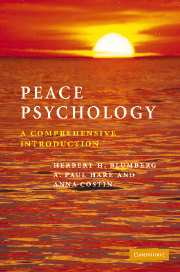Book contents
- Frontmatter
- Contents
- Preface
- Acknowledgements
- The scope, structure and content of this book
- Part I Introduction
- Part II Interdisciplinary practice
- Part III Primary psychological topics
- Part IV Core topics in peace and environmental studies
- 9 Conflict resolution
- 10 Emergency decisions, crisis management and the effects of conflicts
- 11 Nonviolence and peace movements
- 12 Peacemaking, wars and crises
- 13 The Middle East, Russia and other specific areas
- 14 Sustainable development
- Part V Terrorism
- References
- Index
10 - Emergency decisions, crisis management and the effects of conflicts
Published online by Cambridge University Press: 05 June 2012
- Frontmatter
- Contents
- Preface
- Acknowledgements
- The scope, structure and content of this book
- Part I Introduction
- Part II Interdisciplinary practice
- Part III Primary psychological topics
- Part IV Core topics in peace and environmental studies
- 9 Conflict resolution
- 10 Emergency decisions, crisis management and the effects of conflicts
- 11 Nonviolence and peace movements
- 12 Peacemaking, wars and crises
- 13 The Middle East, Russia and other specific areas
- 14 Sustainable development
- Part V Terrorism
- References
- Index
Summary
The present chapter is primarily concerned with the effects of conflicts and how to deal with these effects: some general considerations; ethnopolitical warfare and trauma; projected impact of catastrophic war; and some theoretical, general and specific aspects of risk assessment and conflict management. Although the larger goal for many psychologists is contributing to a just and sustainable society that is free from violent conflict, contemporary reality apparently dictates a need to deal constructively with strife and its aftermath.
In an extensive treatment of the psychology of war, LeShan (2002) considers not only the actual planning for wars and psychological indicators for their early prediction but also how to plan for the peace that follows and relevant implications for the ‘war on terror’.
He notes that no single theory accounts for war in general and moreover that popular intuitive rationales are often fallacious – for instance, that harsh peace treaties are followed by a peace of especially short duration, that leaders typically use war to divert attention from domestic problems, that one of the warring parties is necessarily ‘to blame’, or that all wars follow from a single cause (which may, depending on the theory one espouses, be seen as human nature, economic stridency or the nature and structure of social groups). Anti-war actions, whether or not in the service of any theory, do not seem to have put an end to war.
- Type
- Chapter
- Information
- Peace PsychologyA Comprehensive Introduction, pp. 133 - 140Publisher: Cambridge University PressPrint publication year: 2006

